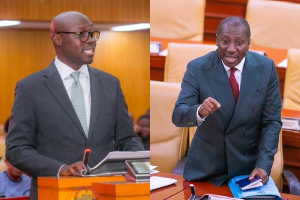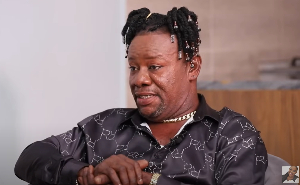…knowing the playing field is now narrow
The NDC have launched their manifesto after tactically waiting for the CPP and the NPP to outdoor theirs first and it is quite refreshing to see that now all the major political parties have set out their vision for the forthcoming elections. It is quite ironic that the NDC had a year, after their nomination of Prof. Mills to set out their vision but instead spent the entire year deciding whether to align or distance themselves with PNDC and NDC marks 1 and 2 under former President Rawlings, while at the same time stepping up on negativity and personal attacks on the NPP. One would have expected that having had such an ample opportunity they would have taken the centre stage in terms of vision and ideas but have now allowed the plying field to be narrowed on them. It is therefore no wonder that in launching this too little to late manifesto, Professor Mills opens his account in the preface with a salad of attacks on the NPP and falsehoods and inaccuracies.
In a striking contrast to the NPP flag bearer’s foreword, which focuses on how to move Ghana forward, the NDC leader’s preface is an all out attack on the NPP and its achievement especially in the areas of education, health, environment, economy and in water and electricity utilities. It is amazing how the NDC can choose these very areas where they failed miserably and have consistently failed to cooperate with the government in its policies to improve them.
The NPP manifesto uses its first chapter to remind Ghanaians about its record of stewardship which the NDC have tried, albeit unsuccessfully, to prize voters away from but have sadly given them no where to go because they have not provided alternatives. The NDC manifesto is interestingly silent on their achievement of government, in much the same way as the CPP suffers from amnesia when it comes to Limann’s PNP administration
In a somewhat positive aspect of the manifesto, the NDC seem to have chosen synonyms to mirror the NPP’s four thematic areas. In theme one the NPP manifesto talks about the strengthening and deepening of democracy, the NDC’s talks about transparent and accountable governance. However the NDC talking about transparent and accountable governance, is like the cat saying I can be trusted with a piece of meat. The last NDC government was as impervious as igneous rock and we never saw even one loan agreement debated upon in parliament let alone a public accounts committee sitting in public. Judging from the record of both parties in government, an NPP promising democracy, in fairness, sounds more credible than an NDC government pledging an accountable government. The good governance that the NPP has exhibited as accentuated by the African Peer Review Mechanism and the guarantees of freedom to the individual and the press actually gives meaning to a manifesto pledge that states that the NPP is going to deepen and strengthen democracy. The NDC did not show accountability when it passed the Criminal Libel Law and in opposition campaigned against its abolishment by he NPP. The expression “good governance” appeared in the vocabulary of Ghanaian politics after the year 2000. The NDC ruled with impunity and gave its critics identification hair cuts. It ruled through the iron hands of the unaccountable militia and commandos who were armed to the teeth and now the chickens have come home to roost with armed robbery in our otherwise peaceful society. Instead of using his preamble to attack the NPP, Professor Mills should have used it to apologize to Ghanaians for the bad governance thy put Ghana through over the 19 years before 2001.
In theme two, where the NPP talks about transforming the economy with focus on producing value-added goods and services, rather than primary products, intensifying trade through increases in exports and diversification of trade towards industrial products and financial services and supporting Ghanaian companies to become regionally and globally competitive in strategic areas as well as implement a comprehensive national oil policy to ensure transparency in the management of oil revenue, require the use of Ghanaian goods and services and maximize benefits to local people and the nation as a whole, the NDC mentions “building a stronger economy for real jobs leading to investing in people and expanding infrastructure for economic growth”. The NPP manifesto is built on a solid record of having provided economic stability and prosperity and increased confidence and investment in the Ghanaian economy, quadrupling our GDP from US$4 billion in 2000 to US$16 billion today, more than halving inflation from a mammoth 41% in December 2000 to around 18% today and nearly quadrupling the minimum wage from $US0.60 in 2000 to $US2.25 in 2008. the DC manifesto promise is based on a very poor economic track record which was overseen by Professor JEA Mills and aptly described by the their Deputy Finance Minister, late Victor Selormey in 2000 as “between the devil and the deep blue sea.”
A seemingly out-of-place pledge by the NDC, their manifesto says they will ensure prompt and effective implementation of existing legislation such as the Person with Disability Act and the Whistleblowers Act. Is this an act of desperation? How can one implement an “existing” legislation?
The third theme is the modernisation of our society. This is the area that the NDC clearly realize that the playing field is shrinking. They are beginning to fall on rejected NPP policies and social programmes in health, education and wages. The NDC, a party which they claim was founded on the principle of social justice do not yet seem to have a ready made manifesto pledge on social development but instead their flag bearer says within two years of assumption of office, his Cabinet would present to Parliament a coordinated programme of economic and social development, including agriculture and industrial programmes at all levels, in all sector and in all regions of Ghana as required under Article 36(50 of the Constitution.
However there is one thing the NDC have conceded –they plan to reduce current troubling and unacceptable trends in infant and maternal mortality, review the National Health Insurance Scheme (NHIS) to provide coverage for basic healthcare for all and review the unwieldy bureaucracy and palpable corruption of the scheme but forget that the NHIS provides for free maternal care pregnant women and children under 18 years.
For the first time the NDC official document accepts the centrality of NPP-introduced NHIS as the basis is a healthy nation and agree that the Cash and Carry system could not promote and support quality healthcare for the people. They also agree that the Ghana Universal Salary Structure (GUSS) which the (P)NDC worked with was wrong and therefore would “review and streamline Public Sector Wages”. What the NDC forgets is that the NPP government has already seen the ills of it and has moved towards Fair Wage System and has set up a Fair wage Commission to deal with that with the view to boosting productivity and towards paying decent wages for the working people.
The NDC also concede that the NPP was right in implementing the School Feeding Programme which they used the CJA, their alter ego, to malign. The NDC say they would mobilize additional external resources to be able to expand and improve the quality of the School Feeding Programme- a programme they opposed and walked out of parliament when it was being introduced and debated upon. The NDC now says they would now use the NPP introduced Capitation Grant to create as a true and proper requirement for the provision the Free Compulsory Universal Basic Education (FCUBE).
The NDC is now chewing the cuddle, accepting what they rejected because the field is already occupied by the NPP.
Sadly they have not got the answers that the NPP Communication Team asked them:
• We are for strengthening the NHIS and investing in sanitation. What are they for?
• We are for transforming the North. What are they for?
• We are for making secondary education free and putting the teacher at the centre of our education. What are they for?
• We are for expanding the National Youth Employment Programme to cover 500 thousand people. What are they for?
• We are for doubling the police force to protect people. What are they for?
• We are for providing retirement security through housing and other benefits. What are they for?
The NPP manifesto is clear in its vision that a modern, prosperous Ghana needs modern, reliable infrastructure. We will therefore build better roads, railways, cities, communications networks and water and energy supplies to propel agricultural, industrial and economic development. Our record in government back this assertion up because so far we have increased the road network by over 60% from 39,000km in 2000 to nearly 65,000km today, doubled the number of roads in good condition and halved those in bad condition and introduced Metro Mass Transport providing a cheaper and more reliable service. The NDC like the Burn’s Constitution of 1945 is “bogus and fraudulent at birth.”
We have to move forward with the NPP Manifesto.
Wonya wohie!
Kwesi Atta-Krufi, Hayford London
Opinions of Saturday, 11 October 2008
Columnist: Hayford, Kwesi Atta-Krufi


















